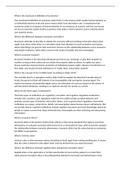What is the neoclassical definition of economics?
The neoclassical definition of economics states that it is the science which studies human behavior as
a relationship between ends and scarce means which have alternative uses. It emphasizes that
economics exists in all aspects of human behavior in circumstances of scarcity, and that any human
act has an economic aspect insofar as persons must make a choice between scarce material and/or
non-material means.
What is the difference between economics and ethics?
Economics attempts to describe or explain the economy without reaching conclusions about what
ought to be done, while ethics is a normative study that attempts to reach normative conclusions
about what things are good or bad. Economics focuses on the relationship between scarce resources
and people's behavior, while ethics concerns the study of morality and moral standards.
What is economic freedom?
Economic freedom is the idea that individuals are free to use, exchange, or give their property to
another as long as their actions do not violate the property rights of others. It implies low taxes
(hence small size of government), protection of individual property rights, absence of restrictions on
free trade, and no government interference in credit, labor, and product markets.
What is the concept of the 'invisible hand' according to Adam Smith?
The 'invisible hand' is a metaphor used by Adam Smith to explain the idea that if people interact
freely, the pursuit of their self-interest is not incompatible with serving the common good. The
market mechanism automatically adjusts prices and allocation of resources based on the actions of
self-interested individuals, resulting in an optimal outcome for society as a whole.
What are the three types of institutions?
The three types of institutions are regulative, normative, and cognitive. Regulative institutions
include rules, sanctions, and regulations which tend to codify socially accepted behavior and
promote certain types of behavior and restrict others, such as government regulations. Normative
institutions are values, social norms, beliefs, and assumptions about human nature and behavior that
are socially shared. Cognitive institutions include cognitive structures and social knowledge shared by
people in a given country that shape inferential sets that people use when selecting and interpreting
information.
What is economic ethics?
Economic ethics is the branch of ethics that reflects on the moral standards that apply to economic
phenomena. It evaluates economic phenomena from a moral point of view, while economics explains
the relationship between economic phenomena. Economic ethics has the same domain as economics
but differs in perspective.
What is intrinsic value?
Intrinsic value is when someone values something in itself, apart from valuing anything else. It means
that the value is inherent in the object itself, and not derived from any external factors.
What is the difference between applied ethics and general normative ethics?
Applied ethics is the application or further specification of moral action guides to a certain field,
while general normative ethics is the philosophical attempt to formulate and defend basic moral





